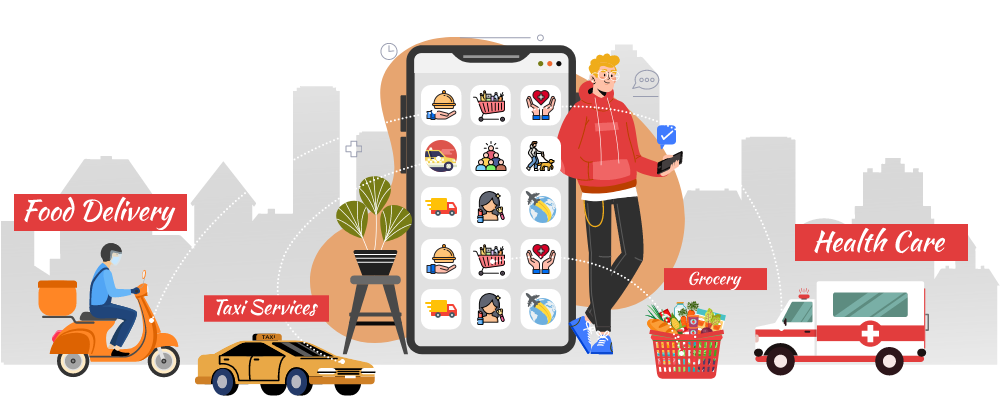business-services

October 08,2025 • 5 min read
What Makes On-Demand Apps Essential in Today’s Digital Economy

In today’s hyperconnected world, where convenience drives customer choices, on-demand apps have become the backbone of the digital economy. From booking a cab to ordering groceries or scheduling home services, these apps redefine how consumers interact with businesses. The rise of on demand app development has transformed industries, empowering brands to deliver faster, smarter, and more personalized experiences that align with modern consumer expectations.
This article explores what makes on-demand apps an indispensable part of the modern business landscape and why every company—from startups to enterprises—is racing to integrate them into their operations.
The Shift Toward Instant Gratification
Modern consumers expect everything to happen in real-time. Whether it’s streaming entertainment, shopping online, or accessing services, waiting is no longer an option. On-demand apps thrive on this culture of instant gratification.
They bridge the gap between supply and demand, connecting users with service providers at the tap of a button. Companies like Uber, DoorDash, and Zomato have built their success on this model—delivering convenience, speed, and reliability in a seamless user experience.
In essence, on-demand technology caters to the “now” mindset that defines the digital economy, making it a must-have for businesses aiming to stay relevant.
Empowering Businesses Through Digital Transformation
For businesses, the value of on-demand apps extends far beyond customer satisfaction. They serve as a powerful tool for digital transformation—automating workflows, improving operational efficiency, and enhancing decision-making through real-time analytics.
For example, a logistics company can use an on-demand platform to track deliveries, manage driver routes, and communicate directly with customers. Similarly, healthcare organizations are adopting on-demand models to connect patients with doctors virtually.
This digital evolution is powered by strategic on demand app development, where businesses integrate technology to offer faster services, boost engagement, and streamline processes—all while cutting down operational costs.
Personalization as the New Standard
One of the key reasons on-demand apps dominate today’s market is personalization. Unlike traditional systems, on-demand platforms learn user behavior through AI and analytics, allowing businesses to tailor services according to individual preferences.
From customized product recommendations to location-based offers, personalization enhances user satisfaction and increases retention. Customers feel valued when the app “understands” their needs, creating long-term loyalty.
Personalization is no longer a luxury—it’s an expectation. Brands that leverage data-driven personalization through on-demand systems gain a significant competitive advantage.
Expanding Market Reach and Accessibility
The beauty of on-demand technology lies in its inclusivity. It enables small and medium-sized businesses to reach audiences they couldn’t access before. A local salon can attract clients across an entire city, a home chef can deliver meals to hundreds of new customers, and a freelance professional can find consistent work—all through a mobile platform.
With the right on demand app development strategy, businesses can break geographical barriers and operate 24/7 without increasing manpower. This scalability is one of the major reasons why companies continue to invest heavily in custom app solutions.
Moreover, these apps provide customers with accessibility—services are available at their convenience, anytime and anywhere. This mutual benefit has fueled the massive adoption of on-demand models across multiple industries.
Trust, Transparency, and Real-Time Interaction
Another defining factor that makes on-demand platforms indispensable is the transparency they bring to transactions. Users can track their orders, monitor service progress, view real-time updates, and rate providers instantly.
This visibility builds trust, a key element of modern consumer relationships. Businesses that maintain open communication channels through their apps often see improved user retention and higher ratings.
Additionally, the ability to interact with customers in real time helps companies address issues proactively and enhance user satisfaction—turning occasional buyers into loyal advocates.
Driving Data-Backed Business Decisions
Every interaction on an on-demand platform generates valuable data. This data helps businesses identify usage patterns, predict demand, and refine their services. Decision-makers can leverage these insights to optimize pricing, marketing campaigns, and customer engagement strategies.
For example, a food delivery app can analyze which cuisines are most ordered in a specific region and promote them strategically. Similarly, a service-based business can identify peak hours and allocate resources efficiently.
Supporting Sustainability and Efficiency
Beyond convenience and profit, on-demand apps also promote sustainability. By optimizing routes, minimizing resource waste, and reducing physical infrastructure needs, they contribute to a more eco-friendly business model.
For instance, ride-sharing platforms help reduce the number of vehicles on the road, while delivery apps can consolidate multiple orders for fuel efficiency. As environmental awareness grows, integrating sustainable practices into app ecosystems is becoming a key differentiator for forward-thinking brands.
Adapting Across Industries
The on-demand revolution is not limited to transportation or food delivery—it has expanded into virtually every sector:
-
Healthcare: Telemedicine and virtual consultations are bridging the gap between doctors and patients.
-
Education: Students can access personalized tutoring and digital classrooms instantly.
-
Home Services: From plumbing to beauty treatments, professionals are just a click away.
-
Ecommerce: Instant delivery and return options enhance shopping convenience.
-
Finance: Apps now enable instant loans, payments, and investment tracking.
This widespread adoption proves that on-demand technology is not just a passing trend—it’s a foundation for the future economy.
Conclusion: A Digital Necessity, Not a Choice
In today’s fast-paced economy, convenience, speed, and personalization define business success. On-demand apps encapsulate all three, reshaping how consumers engage with brands and how businesses deliver value.
As industries continue to evolve, companies that embrace the on-demand model will not just stay competitive—they’ll lead the market. The era of waiting is over; the future belongs to those who can deliver instantly.
Whether you’re a startup or an enterprise, investing in smart on demand app development isn’t just an option—it’s the key to thriving in the digital economy.
Amelia Moore Details
User Profile
- Full name
- Amelia Moore
- Email address
- ameliamoore1407@gmail.com
- Join Date
- 2025-10-08
- State
- City
- Pincode
- Address
- Follow us on Facebook
- Follow us on Twitter
- Website Name
- Bio